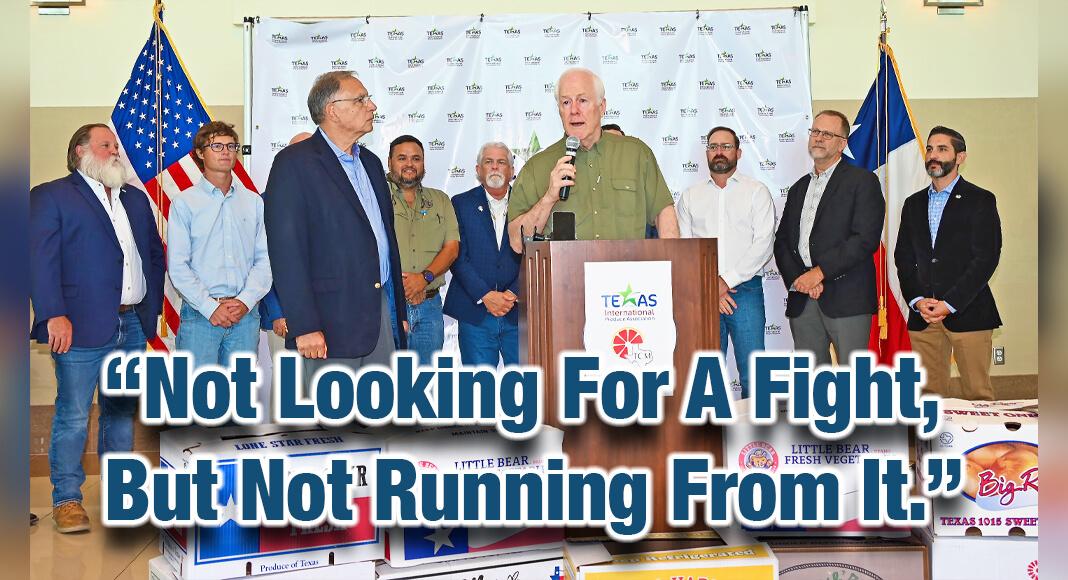
Texas Border Business
Mission, Texas — U.S. Senators John Cornyn (R-TX) and John Boozman (R-AR), the Senate Agriculture Committee’s Ranking Member, recently convened with agriculture stakeholders in the Rio Grande Valley to discuss urgent issues impacting Texas agriculture. This roundtable focused on the Farm Bill, Mexico’s non-compliance with the 1944 Water Treaty, and the pressing need for increased water supply to support the region’s agricultural industry.
Senator Cornyn opened the discussion by stressing the gravity of the situation, describing it as an “existential crisis for Texas agriculture.” The crisis stems from Mexico’s persistent failure to deliver water to the Rio Grande Valley, violating the 1944 Water Treaty. Cornyn explained, “Mexico, contrary to a treaty that’s been in effect since 1944, has withheld huge volumes of water necessary to the agricultural industry here in the Rio Grande Valley. We’ve tried everything from diplomacy to threatening to withhold financing from Mexico, and we’re still going.”
Cornyn emphasized that Mexico’s actions have created an unfair advantage for its own agricultural sector. “Mexico continues to use that water to grow its own agriculture industry and to then import or export that into the United States,” Cornyn noted. This has placed Texas farmers at a severe disadvantage, threatening both the local economy and food security.
Not Looking to Pick a Fight, but Not Running Away Either
The senators expressed frustration with the current administration’s handling of the situation, specifically citing a lack of assertiveness in negotiations. Cornyn stated, “The current administration has said that if we push too hard on Mexico to release the water they’re obligated to do under the 1944 treaty, they may push back. But the fact of the matter is, we can’t take no for an answer, and we don’t intend to take no for an answer.”
Clarifying their stance, Cornyn asserted, “We are not looking to pick a fight, but we are not going to run away from a fight if Mexico insists upon it. We’re going to use every tool in the toolbox.” This sentiment reflects a strategic approach that balances diplomacy with the willingness to use economic or political pressure to achieve compliance from Mexico.
Senator Boozman highlighted the economic implications of the water crisis, noting, “It’s not just farmers that are affected; it’s the entire economy. The farmers don’t have money and can’t spend in town. People in town don’t have money. So, the list goes on and on.” This interconnectedness between agriculture and the local economy underscores the urgency of resolving the water dispute.
Boozman also emphasized the United States’ role in maintaining trade agreements and treaties, stating, “We work hard; we work these trade deals, we work treaties. The United States is good about keeping our end of the bargains with these things, but we don’t hold others accountable.” His remarks suggest a need for stricter enforcement of international agreements to protect American interests.
Beyond the immediate water issues, the roundtable discussion also discussed the ongoing negotiations for the Farm Bill, which is due for reauthorization. Senator Cornyn criticized the bill’s current focus, arguing that “production agriculture seems to have taken a back seat to other programs like nutrition programs.” While acknowledging the importance of nutrition programs, Cornyn and Boozman emphasized the need to “put the farm back in the Farm Bill” to ensure adequate support for farmers.
Senator Boozman reiterated the importance of the Farm Bill as a “contract with our farmers” that comes up every five years. He noted, “We need to help them with a good, strong farm bill to help them rent to manage their risk, the crop insurance part of that, and things like that so they can afford and be successful.”
Both senators expressed their commitment to finding a resolution to the water crisis and supporting Texas agriculture through legislative means. Cornyn announced plans to attend the inauguration of Mexico’s new president, hoping to use this opportunity to press for a change in policy regarding the 1944 Water Treaty. “We were hoping that with the new administration in Mexico, this would be an opportunity for a change in the course,” he said.
Boozman supported this approach, stressing the importance of firsthand accounts and local perspectives in shaping policy decisions. “It’s one thing to discuss these things in Washington; it’s another thing to come and actually visit with producers firsthand,” he remarked, stressing the value of direct engagement with those affected by policy decisions.
The roundtable in Mission, Texas, brought to light the critical challenges facing the agriculture sector due to water shortages and emphasized the need for strong legislative action. Senators Cornyn and Boozman made it clear that while they are not seeking conflict, they will not back down in defending the rights and livelihoods of Texas farmers. As Cornyn aptly said, “We are not going to accept the status quo. We’re going to demand and insist on Mexico living up to its obligations, and we will look to whatever tools are necessary to achieve a just and correct result.”
See related stories:














